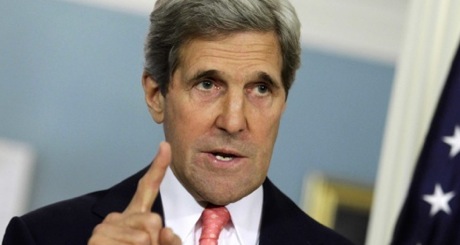U.S. Secretary of State John Kerry
[South Sudan Crisis]
The United States has called on South Sudan’s President Salva Kiir to immediately release Former Vice President Riek Machar’s colleagues so that the Addis Abbaba peace talks to end fighting can “be meaningful and productive.”
The conflict in South Sudan erupted December 15 as a power struggle between Kiir and Machar but has quickly taken on an ugly ethnic dimension with Kiir’s armed supporters attacking Nuers and Machar’s backers targeting Dinkas.
There are no firm estimates of people killed although the 1,000 figure has been widely used; more than 100,000 people have been displaced from their homes and many sought shelter at UN barracks.
Machar has denied Kiir’s accusations that he’d tried to stage a coup, sparking the fighting. In a report on Sudan Tribune Machar claims his forces are now marching to seize Juba, the capital city.
The U.S. has warned against any attempted military solution to what it’s terms a political conflict. In a statement today, The U.S. Department of State supported Machar’s earlier demands that his political allies who have been detained by Kiir be released so they can take part in the peace talks.
“We urge the Government of South Sudan to uphold its commitments and release political detainees immediately. To be meaningful and productive, discussions of political issues requires the presence of the senior SPLM members currently detained in Juba, among others,” the statement, released by Marie Harf, deputy State Department spokesperson, said.
Machar had made his side’s participation on the talks conditional on the release of his colleagues. Machar’s allies include Pagan Amum, the former ruling SPLM’s Secretary General and the chief negotiator during dispute with Sudan that had led to the temporary halt in oil exports; pipelines run through Sudan.
“These talks are of critical importance to the people of South Sudan. There can be no military solution to this conflict. Forging a durable and lasting peace depends on resolving the underlying political causes of the conflict. Special Envoy Booth’s presence at the talks in Addis Abbaba underscores our enduring commitment to peace, reconciliation, and a unified, democratic South Sudan,” the statement adds, referring to U.S. Special Envoy to Sudan and South Sudan, Donald E. Booth.
“The parties must use these talks to make rapid, tangible progress on a cessation of hostilities, humanitarian access, and the status of political detainees,” the statement also said.








